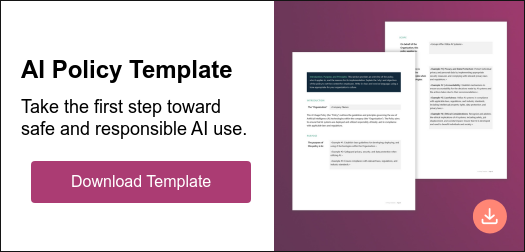Why Your Organization Needs an AI Policy
At this point, you're planning to, or are already using AI in some way as part of your work and personal life.
Of course, with the good comes the bad. In the case of AI, it can bring significant risks if not properly managed, especially around issues relating to ethics, data privacy, and compliance.
Organizations that use AI solutions without proper guidelines and expectations put themselves and their stakeholders at risk.
That is where an AI policy comes in. Yes, another policy. And your organization’s AI policy is not one you want to ignore or push off. An AI policy, also known as an AI acceptable use policy, outlines how these tools will be used and what safeguards will be in place.
Why is an AI policy important?
- Users need clear guidance.
- AI isn’t always right.
- Address compliance and AI security concerns.
- Protect the company's reputation and data.
What an AI Policy Should Do
A strong AI policy helps your organization:
-
Set expectations for how employees should use AI tools, including what’s allowed and what isn’t.
-
Prevent Shadow AI by outlining approved tools and processes for requesting new ones.
-
Protect data by explaining what types of data can’t be shared with AI systems.
-
Support compliance with regulations related to privacy, security, and industry-specific requirements.
-
Guide decision-making as new AI capabilities emerge
Risks AI Policies Help Prevent
Even well-intentioned use of AI can introduce risk.
Your policy should address common threats such as:
-
Sensitive data being uploaded into public AI tools
-
Hallucinated or inaccurate outputs used without verification
-
Unapproved AI apps creating compliance, licensing, and security gaps
-
Loss of IP when proprietary information is fed into external systems
-
Bias or quality issues that impact business-critical work
Adding a clear section on these risk categories helps employees understand why the rules matter—not just what they are.
Best Practices for Writing an AI Policy
Here are some best practices to keep in mind when creating your policy:
- Involve stakeholders: Get input from all relevant stakeholders, including compliance officers, IT, security, operational managers, and legal counsel.
- Avoid Jargon: Write the AI policy in clear, understandable language accessible to everyone in your organization.
- Address specific risks: Include risks and compliance requirements related to your organization and industry.
- Review and update regularly: Keep your AI policy up to date as new threats emerge and new AI tools are used.
Key Components to Include
Your AI policy need to include sections such as:
-
Purpose & Scope
-
Approved AI Tools
-
Data Handling Requirements
-
Acceptable & Unacceptable Use
-
Human Oversight Expectations
-
Roles & Responsibilities
-
Exception Processes
You will also want to outline how new AI tools get evaluated, especially if you’re implementing Copilot, custom agents, or department-specific solutions.
Start Your AI Policy Now
Use our AI policy template to get started now.
Your AI Policy Is Just the Beginning
To move from policy → AI adoption → value, you should also consider:
These elements help ensure AI use is strategic and safe.
Ready to Build or Strengthen Your Policy?
If you need help drafting, reviewing, or rolling out your AI policy, contact us.

Director of Marketing Rebecca leads ProArch's marketing efforts, seamlessly blending technology and storytelling to assist clients in their buying journey. She is dedicated to presenting technological solutions in a compelling manner that drives significant growth for the company. Collaborating closely with sales, engineering, leadership, and HR teams, Rebecca sets the strategic vision for ProArch and ensures alignment across the organization. Her strategic, visionary, and detail-oriented approach shapes ProArch’s brand to be synonymous with reimagining technology to achieve business objectives.


